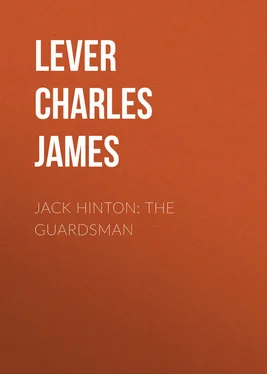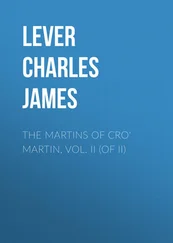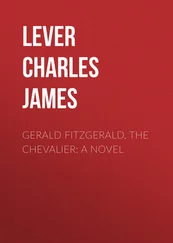Charles Lever - Jack Hinton - The Guardsman
Здесь есть возможность читать онлайн «Charles Lever - Jack Hinton - The Guardsman» — ознакомительный отрывок электронной книги совершенно бесплатно, а после прочтения отрывка купить полную версию. В некоторых случаях можно слушать аудио, скачать через торрент в формате fb2 и присутствует краткое содержание. Жанр: literature_19, foreign_antique, foreign_prose, на английском языке. Описание произведения, (предисловие) а так же отзывы посетителей доступны на портале библиотеки ЛибКат.
- Название:Jack Hinton: The Guardsman
- Автор:
- Жанр:
- Год:неизвестен
- ISBN:нет данных
- Рейтинг книги:5 / 5. Голосов: 1
-
Избранное:Добавить в избранное
- Отзывы:
-
Ваша оценка:
- 100
- 1
- 2
- 3
- 4
- 5
Jack Hinton: The Guardsman: краткое содержание, описание и аннотация
Предлагаем к чтению аннотацию, описание, краткое содержание или предисловие (зависит от того, что написал сам автор книги «Jack Hinton: The Guardsman»). Если вы не нашли необходимую информацию о книге — напишите в комментариях, мы постараемся отыскать её.
Jack Hinton: The Guardsman — читать онлайн ознакомительный отрывок
Ниже представлен текст книги, разбитый по страницам. Система сохранения места последней прочитанной страницы, позволяет с удобством читать онлайн бесплатно книгу «Jack Hinton: The Guardsman», без необходимости каждый раз заново искать на чём Вы остановились. Поставьте закладку, и сможете в любой момент перейти на страницу, на которой закончили чтение.
Интервал:
Закладка:
The vine twig shows not more ingenuity, as it traverses some rocky crag in search of the cool stream, at once its luxury and its life, than does our injured self-love, in seeking for consolation from the inevitable casualties of fate, and the irresistible strokes of fortune! Thus I found comfort in the thought that the ridicule attached to me rather proceeded from the low standard of manners and habits about me than from anything positively absurd in my position; and, in my warped and biassed imagination, I actually preferred the insolent insipidity of Lord Dudley de Vere to the hearty raciness and laughter-loving spirit of Phil O’Grady.
My reflections were now cut short by the order for the staff to mount, and, following the current of my present feelings, I drew near to Lord Dudley, in whose emptiness and inanity I felt a degree of security from sarcasm, that I could by no means be so confident of in O’Grady’s company.
Amid the thunder of cannon, the deafening roll of drums, the tramp of cavalry, and the measured footfall of the infantry columns, these thoughts rapidly gave way to others, and I soon forgot myself in the scene around me. The sight, indeed, was an inspiriting one; for, although but the mockery of glorious war, to my unpractised eye the deception was delightful: the bracing air, the bright sky, the scenery itself, lent their aid, and, in the brilliant panorama before me, I soon regained my light-heartedness, and felt happy as before.
CHAPTER VI. THE SHAM BATTLE
I have mentioned in my last chapter how very rapidly I forgot my troubles in the excitement of the scene around me. Indeed, they must have been much more important, much deeper woes, to have occupied any place in a head so addled and confused as mine was. The manoeuvres of the day included a sham battle; and scarcely had his Excellency passed down the line, when preparations for the engagement began. The heavy artillery was seen to limber up, and move slowly across the field, accompanied by a strong detachment of cavalry; columns of infantry were marched hither and thither with the most pressing and eager haste; orderly dragoons and staff-officers galloped to and fro like madmen; red-faced plethoric little colonels bawled out the word of command till one feared they might burst a bloodvessel; and already two companies of light infantry might be seen stealing cautiously along the skirts of the wood, with the apparently insidious design of attacking a brigade of guns. As for me, I was at one moment employed carrying despatches to Sir Charles Asgill, at another conveying intelligence to Lord Harrington; these, be it known, being the rival commanders, whose powers of strategy were now to be tested before the assembled and discriminating citizens of Dublin. Not to speak of the eminent personal hazard of a service which required me constantly to ride between the lines of contending armies, the fatigue alone had nigh killed me. Scarcely did I appear, breathless, at head-quarters on my return from one mission, when I was despatched on another. Tired and panting, I more than once bungled my directions, and communicated to Sir Charles the secret intentions of his Lordship, while with a laudable impartiality I disarranged the former’s plans by a total misconception of the orders. Fatigue, noise, chagrin, and incessant worry had so completely turned my head, that I became perfectly incapable of the commonest exercises of reason. Some of the artillery I ordered into a hollow, where I was told to station a party of riflemen. Three squadrons of cavalry I desired to charge up a hill, which the 71st Highlanders were to have scrambled up if they were able. Light dragoons I posted in situations so beset with brushwood and firs, that all movement became impossible; and, in a word, when the signal-gun announced the commencement of the action, my mistakes had introduced such a new feature into tactics, that neither party knew what his adversary was at, nor, indeed, had any accurate notion of which were his own troops. The Duke, who had watched with the most eager satisfaction the whole of my proceedings, sat laughing upon his horse till the very tears coursed down his cheeks; and, as all the staff were more or less participators in the secret, I found myself once more the centre of a grinning audience, perfectly convulsed at my exploits. Meanwhile, the guns thundered, the cavalry charged, the infantry poured in a rattling roar of small arms; while the luckless commanders, unable to discover any semblance of a plan, and still worse, not knowing where one half of their forces were concealed, dared not adventure upon a movement, and preferred trusting to the smoke of the battle as a cover for their blunders. The fusilade, therefore, was hotly sustained; all the heavy pieces were brought to the front; and while the spectators were anxiously looking for the manoeuvres of a fight, the ammunition was waxing low, and the day wearing apace. Dissatisfaction at length began to show itself on every side; and the Duke assuming, as well as he was able, somewhat of a disappointed look, the unhappy generals made a final effort to retrieve their mishaps, and aides-de-camp were despatched through all the highways and byways, to bring up whoever they could find as quickly as possible. Now then began such a scene as few even of the oldest campaigners ever witnessed the equal of. From every dell and hollow, from every brake and thicket, burst forth some party or other, who up to this moment believed themselves lying in ambush. Horse, foot, and dragoons, artillery, sappers, light infantry, and grenadiers, rushed forward wherever chance or their bewildered officers led them. Here might be seen one half of a regiment blazing away at a stray company of their own people, running like devils for shelter; here some squadrons of horse, who, indignant at their fruitless charges and unmeaning movements, now doggedly dismounted, were standing right before a brigade of twelve-pounders, thundering mercilessly amongst them. Never was witnessed such a scene of riot, confusion, and disorder. Colonels lost their regiments, regiments their colonels. The Fusiliers captured the band of the Royal Irish, and made them play through the heat of the engagement. Those who at first expressed enmui and fatigue at the sameness and monotony of the scene, were now gratified to the utmost by its life, bustle, and animation. Elderly citizens in drab shorts and buff waistcoats explained to their listening wives and urchins the plans and intentions of the rival heroes, pronouncing the whole thing the while the very best field-day that ever was seen in the Phoenix.
In the midst of all this confusion, a new element of discord suddenly displayed itself. That loyal corps, the Cork militia, who were ordered up to attack close to where the Duke and his staff were standing, deemed that no better moment could be chosen to exhibit their attachment to church and state than when marching on to glory, struck up, with all the discord of their band, the redoubted air of “Protestant Boys.” A cheer burst from the ranks as the loyal strains filled the air; but scarcely had the loud burst subsided, when the Louth militia advanced with a quick step, their fifes playing “Vinegar-hill.”
For a moment or two the rivalry created a perfect roar of laughter; but this very soon gave way, as the two regiments, instead of drawing up at a reasonable distance for the interchange of an amicable blank cartridge, rushed down upon each other with the fury of madmen. So sudden, so impetuous was the encounter, all effort to prevent it was impracticable. Muskets were clubbed or bayonets fixed, and in a moment really serious battle was engaged; the musicians on each side encouraging their party, as they racked their brains for party-tunes of the most bitter and taunting character; while cries of “Down with King William I.” “To hell with the Pope?” rose alternately from either side.
Читать дальшеИнтервал:
Закладка:
Похожие книги на «Jack Hinton: The Guardsman»
Представляем Вашему вниманию похожие книги на «Jack Hinton: The Guardsman» списком для выбора. Мы отобрали схожую по названию и смыслу литературу в надежде предоставить читателям больше вариантов отыскать новые, интересные, ещё непрочитанные произведения.
Обсуждение, отзывы о книге «Jack Hinton: The Guardsman» и просто собственные мнения читателей. Оставьте ваши комментарии, напишите, что Вы думаете о произведении, его смысле или главных героях. Укажите что конкретно понравилось, а что нет, и почему Вы так считаете.












